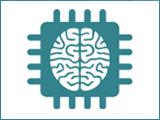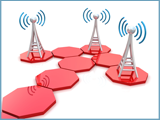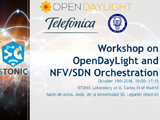IMDEA Networks

Event Category: External Presentation (External Speaker)
Big Crisis Data - an exciting frontier for applied computing
Social media is an invaluable source of time-critical information during a crisis. However, emergency response and humanitarian relief organizations that would like to use this information struggle with an avalanche of social media messages, exceeding their capacity to process them.
Seguir leyendo arrow_right_altTime-Critical Social Mobilization: from the DARPA Red Balloon Challenge to the Nightmare Machine
This seminar explores the physical, behavioral, and computational limits of crowd-assembly for problem-solving.
Seguir leyendo arrow_right_altOTFS: A New Generation of Modulation Addressing the Challenges of 5G
A new two-dimensional modulation technique called Orthogonal Time Frequency Space (OTFS) modulation designed in the delay-Doppler domain is introduced as a waveform ideally suited to new 5G use cases. Through this design, which exploits full diversity over time and frequency, OTFS coupled with equalization converts the fading, time-varying wireless channel experienced by modulated signals such as OFDM into a time-independent channel with a complex channel gain that is roughly constant for all symbols. Thus, transmitter adaptation is not needed. This extraction of the full channel diversity allows OTFS to greatly simplify system operation and significantly improves performance, particularly in systems with high Doppler, short packets, and large antenna arrays. Simulation results indicate at least several dB of block error rate performance improvement for OTFS over OFDM in all of these settings which translates to significant spectral efficiency improvements.
Seguir leyendo arrow_right_alt
Towards a Future Multi-Service Mobile Network Architecture
5G is on the horizon. In this talk, I will take a service-oriented perspective of 5G aimed at supporting a wide range of services, differing significantly in their service requirements and device types (including machine-type devices).
Seguir leyendo arrow_right_altTelefónica comparte con 5TONIC su visión sobre las tendencias y perspectivas del sector
Invitado por 5TONIC, D. Carlos Gavilanes, Director de Estrategia de Telefónica Corp., ha compartido con algunos destacados expertos de IMDEA Networks y la Universidad Carlos III (UC3M) la visión de la compañía sobre las principales tendencias de la industria y las perspectivas sectoriales para los próximos tres años.
Seguir leyendo arrow_right_altInterference-aware Flexible TDD Design for Massive MIMO 5G Systems
Both the use of very large arrays of antennas and flexible time division duplexing (TDD) designs have become prominent features of next generation 5G cellular systems.
Seguir leyendo arrow_right_altRadical business innovation with machine learning and intelligent optimization
Learning and Intelligent Optimization (LION) is the combination of machine learning from data and optimization to solve challenging and dynamic problems, previously thought to require intelligent human intervention and creativity.
Seguir leyendo arrow_right_alt1st ETSI NFV PLUGTESTS
ETSI Centre for Testing and Interoperability will be organizing its first NFV PlugtestsTM event on 23 January to 3 February 2017, hosted by 5TONIC Laboratory, headquartered at IMDEA Networks Institute, in Leganés, Madrid, Spain.
Seguir leyendo arrow_right_altSmart Antenna Systems and Reconfigurable Radios based on Functional Materials
There is a considerable demand for reconfigurable/tunable and compact devices in the Radio Frequency (RF) frontend modules as well as in the antenna systems in modern and future wireless systems for broadcast, communications, radar and imaging, either for frequency tuning and adaptive power matching as well as for polarization tuning and electronic beam steering.
Seguir leyendo arrow_right_altWorkshop on OpenDayLight and NFV/SDN Orchestration
5TONIC, junto con IMDEA Networks, OpenDayLight, Universidad Carlos III de Madrid (UC3M) y Telefónica anuncian la celebración del evento ‘Workshop on OpenDayLight and NFV/SDN Orchestration’, que se celebrará en la UC3M el día 19 de octubre. Este evento es patrocinado por la Fundación Linux.
Seguir leyendo arrow_right_alt











Comentarios recientes